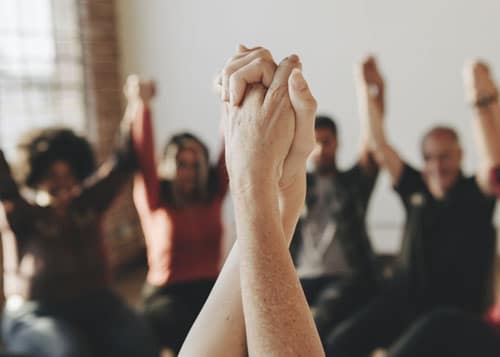Addiction is a disease that a person has to actively and continuously combat in order to remain sober. As a result, many people who suffer from addiction end up relapsing and falling back into unhealthy and addictive habits. One particular reason why many recovering individuals end up relapsing is that they do not replace the negative activities with positive ones. The negative activities they used to take part in when struggling with addiction may prove to be harmful. The lack of positive activity in the lives of recovering addicts often causes them to become idle. This may lead to drug or alcohol use again. So, it is important for recovering individuals to participate in addiction recovery activities.
Relapse Rates and Statistics
According to the National Survey on Drug Use and Health (NSDUH) and the National Institute on Drug Abuse, relapse rates for substance addiction while in recovery are 40%-60%. So, unfortunately, relapses are very common amongst those in recovery.
This just goes to show how important it is to be proactive about maintaining sobriety after addiction treatment. This is especially true for those that are early in their addiction recovery journey, as the further along individuals are in their recovery process, the lower the chances of relapsing is.
Overcoming an addiction from substances or alcohol can be a very hard journey, and it’s important to have a trusted facility and staff by your side while you do it. Behavioral Health Centers is here to offer all our resources so you can live a happier and healthier life.
What Causes Relapse After Addiction Treatment
Relapse occurs when a person that has overcome addiction and gotten sober starts abusing substances again. Many factors can cause a relapse to occur after addiction treatment.
Too Many Negative Influences and Too Little Positive Influences
For one, negative influences can cause a person to relapse. People who are in recovery must no longer socialize with people with whom they used to use substances. It’s also important for people in addiction recovery to gain some positive influences in their lives that will support their recovery journey. That’s why becoming a member of different addiction recovery support groups is a vital relapse prevention tool and addicts should surround themselves with fellow group members instead of their old negative influence friends.
Lack of Concern for One’s Mental Health
A lack of caring for one’s mental health also often leads to relapse. Poor mental health often turns into mental and emotional relapse, which are common precursors to physical relapse. Poor mental health can also lead to relapse because many people first develop addictions due to mental illness. As a result, if a person allows himself to develop poor mental health after recovery, it can cause addictive behaviors to return.
Idleness

Not Making Sobriety Maintenance a Priority
While many recovering addicts may assume that they don’t have to focus on their sobriety anymore once they leave addiction treatment, this couldn’t be further from the truth. In fact, not making sobriety a priority in one’s life as a recovering individual is often the reason why people relapse. This is because not making sobriety a priority can cause mental health issues and negative influences to crop back up in a recovering addict’s life.
All of these triggers for relapse goes to show why participating in addiction recovery activities is so important for a recovering addict. Not only will participating in these activities help recovering individuals meet people and other group members that could act as positive influences in their lives, but it could also improve the mental health of recovering addicts’ while simultaneously keeping them from becoming idle.
Addiction Recovery Activities That Help Prevent Relapse
Addiction recovery activities are any practices that can help a person in recovery to maintain sobriety after addiction treatment. There are numerous addiction recovery activities that can help prevent relapse. The top activities are described below.
Substance Abuse Treatment Planning
Substance abuse treatment planning refers to aftercare planning that you do towards the end of a stint in rehab. Recovering addicts will even work with their doctors at this time to help create an individualized treatment plan that will clinically work for them.
By doing substance abuse treatment planning, recovering addicts will know what support groups and activities that they’re going to take part in once they return home from rehab. Participating in such therapy groups and activities after completing addiction treatment gives recovering addicts the opportunity to expound upon the lessons and skills that they learned while they were in addiction treatment.
The primary goal of substance abuse treatment planning is to prevent recovering addicts from backsliding into addictive behaviors. That way recovering addicts can maintain long-term sobriety.

- Support groups
- Coping skills training
- Staying in a sober living home
- Addiction counseling and education
- Relapse prevention life skills training
- Participating in healthy daily physical activity
- Learning how to implement healthy life routines
- Addiction therapy to help manage daily life stressors
Being an Active Member Of Recovery Groups
Attending addiction support groups is an important activity. It provides recovering addicts with a supportive network made of group members who are recovering from addiction. That way recovering addicts have people that they can call and lean on whenever they are tempted to use substances again.
This is ideal since only other recovering individuals can fully empathize with a person that has suffered from addiction. Examples of substance abuse groups that recovering addicts often attend include 12-step groups, like Alcoholics Anonymous or Narcotics Anonymous, Smart Recovery, and Women for Sobriety.
Living a Healthy Lifestyle
Your body, mind, and soul are all connected. Therefore, poor physical health can lead to poor mental health, which can then ultimately lead to relapsing. Therefore, maintaining good physical health can help prevent relapse. Addiction recovery activities that help recovering addicts maintain good physical health and live healthier lifestyles include exercising and cooking healthy meals.
Creating Structure
One way to prevent idleness from occurring is to create a structured daily routine. One way you can add structure to your life while in addiction recovery is to fill your day up with addiction recovery activities that you routinely participate in. For example, you can wake up every morning at the same time and go for a run.
You can also become a member of a community sports team, religious group, substance abuse group or some other social group that meets up at certain times on certain days. You can even work a certain set of hours each day, each week, or eat the same amount of meals at the same time each day to add structure to your life.
Give Back to Others by Volunteering
Volunteering is one of the best recovery groups activities to participate in. This is because it allows individuals to stop focusing on themselves and instead focus on others. Doing this can provide perspective about what’s important in life.
Helping other group members that also suffer from addiction is particularly beneficial because it reminds one of the importance of sobriety. Thus, helping other group members can help you maintain your sobriety longer.
Volunteering can also act as a form of therapy for an individual in recovery. This is because helping others naturally makes people feel better about themselves and the world around them. Thus, volunteering can boost one’s mood and prevent the development of mental illnesses like depression and anxiety.
Developing New Hobbies
 If you don’t have enough addiction recovery activities to keep you busy, you can always get a new hobby. Picking up new hobbies is beneficial for those recovering because it can boost one’s mood and self-esteem. This is especially true if the hobby that a recovering addict picks up is something that he or she is good at or something that brings out his childhood self version.
If you don’t have enough addiction recovery activities to keep you busy, you can always get a new hobby. Picking up new hobbies is beneficial for those recovering because it can boost one’s mood and self-esteem. This is especially true if the hobby that a recovering addict picks up is something that he or she is good at or something that brings out his childhood self version.
To find hobbies that you would be good at, consider the skills that you have and the hobbies that would lend themselves to those skills. For example, if you’re musically inclined, you can join a choir or start learning how to play an instrument. Other hobbies that a recovering addict can pick up include:
- Writing
- Surfing
- Painting
- Drawing
- Cooking
- Dancing
- Journaling
- Swimming
- Gardening
- Photography
- Rock climbing
- Joining a sports team
Other Relapse Prevention Skills and Techniques
There are other relapse prevention skills and techniques outside of the ones within addiction recovery activities. To learn more about some of these relapse prevention skills, continue reading.
Self-Care: Self-care is when a person caters to his or her own physical, mental, and emotional needs. This is an important part of relapse prevention because it helps recovering addicts function at their best.
This is especially the case since self-care comes in many different forms. In fact, many people who practice this simultaneously take part in addiction recovery activities. For example, improving one’s health through exercise and healthy eating can act as a form of self-care.
Yoga and Meditation: Yoga and meditation is a form of relapse prevention because it helps calm down the minds and enhance one’s anger management skills. Thus, recovering addicts can use yoga and meditation to help them refocus.
Certain forms of yoga can even act as a form of light exercise. Thus, it can help improve the health of recovering addicts.
Deep Breathing: Similar to yoga and meditation, deep breathing can also help refocus and calm the minds of recovering addicts down. Deep breathing can also help calm the nerves and anxiety that newly recovering addicts often feel.
Behavioral Health Centers Will Support Your Addiction Recovery Journey from Beginning to End

Here at Behavioral Health Centers, we know how difficult it is to maintain sobriety after addiction treatment. That’s why we encourage all of our patients to take part in our substance abuse treatment planning. We also provide our patients with therapy and life skills training that they can take part in after they complete their addiction treatment programs.
Here at Behavioral Health Centers, we even provide our patients with addiction recovery activities through resources like nutrition and fitness therapy and yoga and meditation. That way our patients have a better chance of maintaining long-term sobriety. To learn more about Behavioral Health Centers and the different addiction treatment, therapy, and aftercare services that we offer our patients, contact us today!
Overcoming an addiction from substances or alcohol can be a very hard journey, and it’s important to have a trusted facility and staff by your side while you do it. Behavioral Health Centers is here to offer all our resources so you can live a happier and healthier life.

Reviewed by:
Get Help Today
Don’t go through the process of recovery alone. There are people who can help you with the struggle you’re facing. Get in touch with one today.
Recent Posts

Deciding on Care: Understanding When to Seek Inpatient Mental Health Treatment
Identifying the moment when to seek inpatient mental health treatment can be daunting. This article is your straightforward guide to

What to Expect During The Drug Detox Process: Navigating the Journey to Recovery
When embarking on the journey toward recovery, the first critical step we often encounter is the drug detox process. Detox

Understanding How Inpatient Addiction Treatment Works: A Comprehensive Guide
Navigating addiction treatment can be overwhelming. If inpatient care is on your radar, you may wonder how exactly it






